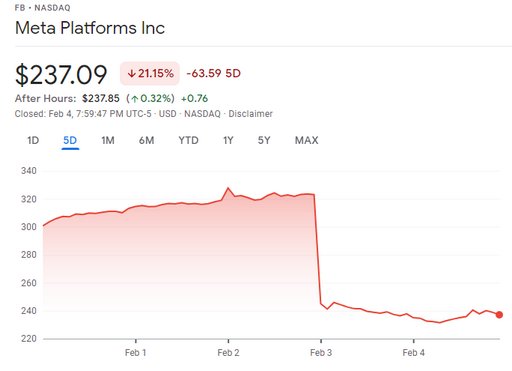“Never Build Your House On Someone Else’s Land”
Monday, February 7th, 2022 -- by Bacchus
This is a long post about how Facebook made the precise mistake I’ve been yelling about since forever. They forgot Bacchus’s First Rule, or stopped thinking it applied to them. And last week, it cost them so many billions of dollars.

I Was There Early: Bacchus’s First Rule Of The Internet, Circa 2004
In various formulations I have preached what I now call Bacchus’s First Rule Of The Internet since 2004, when I got my earliest primitive inkling that social media platforms were the Sarlacc pits where independent websites went to die.
In those distant days, people who wanted to socialize in writing on the internet had started spending more and more time on “blogging services” platforms with primitive social media functionality, rather than making and reading actual free-standing websites. So folks with websites would, increasingly, just move all their shit onto the growing platforms, leaving their old websites behind to dry up and crumble away. Time would pass, and then something (like, for instance, a #pornocalypse event) would destroy their new social media presence, utterly and without recourse.
I believe I got started down this road of thinking when LiveJournal ate the Vintage Sex community. I’m stubborn about not forgetting this shit, and it helps that I have an ancient blog to preserve my ramblings. Whatever little else this old die-hard of a blog may be good for these days, it’s indisputably useful as an aide-mémoire.
After a variety of wording changes in the early years, by 2013 my First Rule finally settled down as follows:
“Anything worth doing on the internet is worth doing on your own server that you control.”
Light Dawns On Marble Head: My Comprehension Grows
In the early days, I honestly thought people were being bone-stupid. Why go put all your content on somebody else’s website — for them to control or delete at a whim — when you could be building your own traffic to your own website? Why give your content and traffic to some other website operator, for free? Why build up their web property instead of your own?
Eventually I came to understand it was not stupidity, but desperation. People in the social media platforms and silos weren’t leaving those spaces. They wouldn’t or couldn’t click away to our websites; our websites were dwindling, not growing. And of course, in the adult space, we feelthy porn people were increasingly not being allowed to put our stuff on the social media sites. Perhaps we were welcome for a short time, when the social media sites were new and desperate for growth. But always, inevitably, the shit would change, and we stinky pornsters would get booted. No exceptions: the pornocalypse comes for us all. I called it in 2013! “Ask not for whom the pornocalypse bell tolls: it tolls for thee.”
Facebook Gets Ever Fatter, And Stupider, Then Stumbles
OK, now put your thumb on the societal fast-forward button. Mash that sucker down hard — as hard as you can! Watch all of the horrible things happen to the web we knew, in a high-speed burst of time-lapsed video, complete with squealing-audio sound effects. Among many other terrible things that happened, Facebook got really huge by eating a lot of other people’s internet lunches. What’s left standing? The infamous five websites (now mostly appearing as apps, which will be important later in this story) are basically it. (That link is to a famous 2018 tweet that says “I’m old enough to remember when the Internet wasn’t a group of five websites, each consisting of screenshots of text from the other four.”) A few vampire tubes bought up most of the porn sites, and the pornocalypse came for just about every last bit of adult content on social media, except on Twitter, where the clock on the time bomb has been ticking for years and getting louder all the time.
But then, last week, Facebook, recently rebranded as “Meta”, had a terrible earnings call, and lost a whole bunch of its market cap in a single trading day:

Whoopsie! But what in the hell happened?
The Biter, Bitten: Facebook Ignored Bacchus’s First Rule
What happened? What happened indeed?
I don’t follow Facebook news closely. To a pornographer, pornocalypse platforms are boring and useless. But I do read online news, and over the years I’ve seen Facebook utterly destroy all but the strongest few independent news platform. One by one, they ignored Bacchus’s First Rule: they took their content to Facebook, gave Facebook their traffic, and then got utterly shafted as Facebook deliberately and repeatedly changed the rules on them.
On Friday, Megan McArdle wrote a column in the Washington Post, which is one of the surviving “independent” (from Facebook, anyway) news platforms. It helps that WaPo is the fully-captive plaything of Jeff Bezos, who happens to be that rare creature, a “not Mark Zuckerberg” internet centibillionaire. Thus WaPo can still pay its people, and so they have some good ones. McArdle’s column is headlined We all learned a painful lesson from Facebook. Now Facebook is learning it, too. McArdle adeptly summarizes how Facebook got fat on people who ignored my First Rule. But then, as she explains, Facebook made the same mistake as its victims, leading to last week’s debacle of a one-day $251-billion market-cap loss.
Please allow me my moment of schadenfreude. All this is of course intensely satisfying to me. Am I officially smarter than the Zuckster now? Hot damn! But of course an instant and obvious rejoinder fills my inwardly-directed ears. In a voice deep and stern, as if my own father were speaking from beyond the grave, I hear “If you’re so smart, why ain’t you rich?”
McArdle writes, with rich expository linkage not reproduced here:
What Facebook is experiencing is a feeling we in the media knew all too well during the platform’s rise. Those users? They were spending time reading about their friend’s baby instead of reading news content written by professionals. And those digital ads Facebook was selling? They were gobbling up market share that used to belong to us news outlets. Without ads, a lot of publications went into precipitous decline.
No hard feelings, of course; all’s fair in love and free-market competition. However, the media was understandably eager to get our hands on some of that sweet, sweet traffic. We scrambled to build Facebook pages to woo readers, and when Facebook started limiting the reach of free pages, we supplemented our traffic by buying ads. We optimized our content for sharing and massaged our headlines to make them compulsively clickable. When Facebook went mobile-first, we mobilized, and when the company informed us that streaming content was the future, we duly pivoted to video.
Whole outlets were built around the clickbait Facebook seemed to want … and then died when Facebook, having encouraged all this activity, abruptly changed the algorithms to favor something else. The outlets that survived tended to be the ones that had largely given up trying to appease this jealous god and instead turned to alternative business models, such as selling subscriptions to a comparatively select few.
And this is where it starts to gets good!
The Jaws That Bite, The Claws That Catch
McArdle goes on to explain precisely where Facebook went wrong. In a nutshell, when Facebook followed people into mobile apps and away from “the internet”, the Facebook people forgot that they don’t actually own mobile. Eventually, inevitably, playing on Apple’s and Google’s private playgrounds caught up with Facebook. Mobile apps don’t run on Facebook’s servers. Mobile apps aren’t under Facebook’s control. They should have listened to… little old me? Some two-bit sex blogger from before the dawn of time?
As a chronological aside, it’s true: ErosBlog’s genuinely one year and 25 days older than “Facemash”, as Facebook was named at first. But, to the company’s great cost, they didn’t listen! The deadly oversight caught up to them last year, when Apple finally sent them a candygram with a bomb in it by changing the IOS platform data-harvesting rules that used to let Facebook make so much money. McArdle again:
In 2012, Mark Zuckerberg decided to take the company all in on a mobile-first strategy. This was disruptive, at first, but in time, he would be seen as a visionary prophet leading his company to the promised land. The problem is, that land wasn’t owned by him. Zuckerberg had shifted his company away from the open platform of the browser and onto a closed system where Apple set the terms. For a long time, that was a very good deal for Facebook — but when Apple decided to alter the deal, Facebook didn’t really have much recourse.
Whoopsie again!
Let’s Do Schadenfreude Some More, That Was Fun
Do I feel a wee tiny bit smug about Facebook losing a quarter-trillion in market cap because they ignored Bacchus’s First Rule? Because Mark Fucking Zuckerberg made the specific mistake in 2012 that I warned about in these pages back in 2004, and then again in 2006, and then again for the third, fourth, and fifth times in 2007? And then some more times in 2010 and in 2011?
Fuck yeah I feel some smugness about that, theydies and gentlethems and glitterkittens! Nobody pays me to be a business consultant, but sometimes I do it anyway, for the sheer pleasure of being right on the internet. If you squint and hold your eyes correctly while you look at this situation, Zuckerberg personally lost thirty billion dollars of net worth in one day for not being an ErosBlog reader. And ErosBlog is totally free! So, you know, fuck that guy. Fuck him in particular.

So Long, And Thanks For The Metaphor
But this blog post from hell is only mostly about pointing out and hooting at Mark Zuckerberg’s predictable strategic missteps. The real reason I gathered you all together here today and subjected you to my endless blather is so that I can share the nifty metaphor McArdle built her whole column around. I wish I’d had this framing at my verbal fingertips back in 2004, and subsequently! Maybe more people would have understood what I meant by my Rule. Her column opens:
In 2015, some professors at Virginia’s Sweet Briar College faced an unusual problem. Through the college, they had purchased homes on campus. The land underneath them, however, was still owned by their employer. And now the college was closing, and presumably selling the campus to someone who might want to use that land for something else.
Happily, Sweet Briar was rescued at the last minute by its alumnae. But the financial cavalry don’t always ride to the rescue just in time, so the plight of the professors nonetheless stands as a vivid example of a wise business adage: “Never build your house on someone else’s land.”
Let’s say that again: Never build your house on someone else’s land.
That’s what Bacchus’s First Rule has been trying to get at ever since 2004. It’s clear, it’s succinct, it communicates with clarity. That tight little sentiment is why this crusty old sex blog is still here, surviving on my sponsorships and generous patrons, long after most of the other sex bloggers moved to Tumblr or wherever, only to get rug-pulled by some sudden pornocalypse event.
After citing her Sweet Briar College example of the “someone else’s land” metaphor operating literally, McArdle references the metaphor as “a wise business adage”. Since I’m not in the business world, I never heard it before. You know this is true because I would have been repeating it at you like a broken record!
A bit of Googling suggests that the adage wasn’t much in the popular parlance before McArdle began writing about it. The earliest reference I found was a 2014 blog post quoting a 2013 paywalled Bloomberg article McArdle herself wrote. I can’t get at the Bloomberg article, but the post summarizes it thusly:
Megan McCardle explains the relevance of a maxim she learned in business school: “Never build your house on someone else’s land.”
So apparently we have McArdle’s B-school professors to thank for this succinct metaphor. Which I hereby do! And McCardle herself has my thanks for popularizing it. Now, if only Zuckerberg had gotten the memo, imagine how much money he might have saved…
Similar Sex Blogging:
- Pornocalypse Ho!
- More Twitter Pornocalypse Incoming
- Pornocalypse Comes For VR Porn On Oculus Headsets
- Please Support The ErosBlog Patreon
- E-Commerce Consulting: Watch Me Do It Wrong
- Social Media #Pornocalypse Is Why We Can't Have Nudes In Playboy
- Pornocalypse Comes For Your Keyword Searches
- No Safe Place To Be Adult
- Where Your Adult Site Visitors Went
- Bacchus's First Rule Of The Internet
- The Pornocalypse Comes For Us All
- Son Of "Anything Worth Doing..."
- Fucked By Ning -- Again
- Blogging Services Still Haven't Stopped Sucking
- Blogging Services Still Suck
- Why Blogging Services Suck







